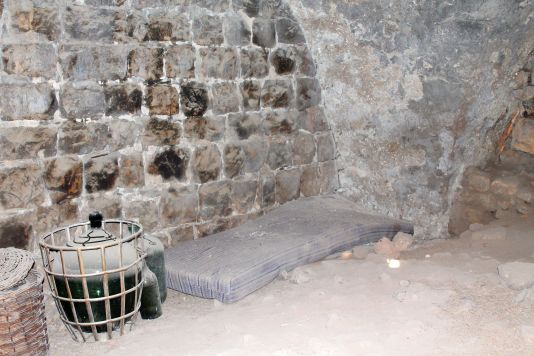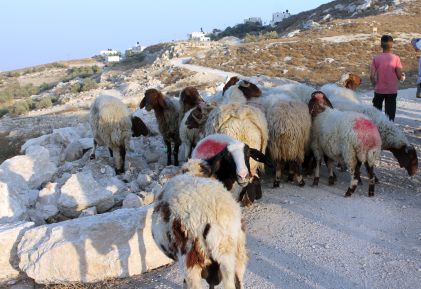Here’s a condensed version of my series on God’s love in the birth of Jesus, as it appeared in the Fall 2021 issue of GO! Christian Magazine …
I remember watching Christmas plays as a child with innkeepers saying, “No rooms!” as they slammed the door on Joseph and nine-month-pregnant Mary. How could those people be so cold-hearted, offering no assistance to a teenage girl about to give birth? When I had children of my own, I knew how difficult it was to travel at the end of a pregnancy. I couldn’t understand why Joseph would put his about-to-deliver wife on a donkey for the journey to Bethlehem.
My husband, Steve, and I went on a pilgrimage to Israel in the fall of 2019. We visited the Herodium fortress late one afternoon, just south of Bethlehem. As we stood at the foot of the mountain overlooking Bethlehem, some shepherd boys joined us with their sheep. With the sun setting and shepherds by our side, we looked toward Bethlehem as our guide shared a heartwarming retelling of the Christmas Story. To hear this compassionate account thrilled my heart as the night descended upon the little town of our Lord’s birth.
“In those days Caesar Augustus issued a decree that a census should be taken of the entire Roman world. And everyone went to his own town to register.” (Luke 2:1, 3)
Joseph traveled with Mary from Nazareth to Bethlehem to register for the census. The journey was approximately 90 to 98 miles.

Common sense dictates that Caesar would allow plenty of time for people to prepare for their journeys, after harvesting their crops and before the cold of winter. Because human nature is the same throughout history, I doubt Joseph would have waited until Mary was late in her pregnancy to begin the trip. Can’t you imagine Joseph’s mother and aunts warning him to leave as soon as possible, knowing how difficult it was for a woman to travel late in pregnancy? We need to set aside the pictures and movies we’ve seen and consider Joseph’s humanity. God chose him to take care of Mary and Jesus. I’m sure Joseph would lovingly bring Mary to Bethlehem before the last stages of pregnancy.
Joseph would also need to coordinate arrangements with the people they’d be traveling with because there was safety in numbers. (Remember the parable of the good Samaritan who helped the man robbed and left for dead on his way from Jerusalem to Jericho.)
“While they were there, the time came for the baby to be born.” (Luke 2:6)
No one would make such a long journey to sign a register, turn around, and head back home. Joseph and Mary had family in Bethlehem and the surrounding area, so it would make sense to stay awhile and visit. (Mary visited her cousin Elizabeth in this area earlier in her pregnancy.)
The Scripture tells us that the time came for Jesus to be born “while they were there,” and not “as soon as they arrived.” We can dispense with the images of a husband and young wife about to go into labor, desperately searching for lodging because they didn’t make plans.
“And she brought forth her firstborn son, and wrapped him in swaddling clothes, and laid him in a manger; because there was no room for them in the inn.” (Luke 2:7)
Most translations keep the basic wording of the 1611 King James Version in the above verse. However, we need to be mindful of the middle-eastern biblical culture of the first century and not the 17th-century culture of the King James translators. First-century middle-eastern homes were constructed with stone. The kitchen was on the main floor, which was also where the family slept. A guest room would be adjacent to the kitchen for storage and visiting guests. Below the main floor, before ascending the stairs to the kitchen, were areas for a few animals, which included a feeding trough or manger. (Families with larger herds hired shepherds to keep watch over their flocks in the fields at night.)

By the 17th century, outdoor wooden stables held animal mangers (feeding-troughs), and biblical customs of the middle-eastern guest-chamber were not well known. Hence, the tradition of Joseph and Mary bringing forth Jesus alone, outside with the animals, was born. A few translations, such as the International Standard Version, paint a clearer picture for us.
“and she gave birth to her first child, a son. She wrapped him in strips of cloth and laid him in a feeding trough, because there was no place for them in the guest quarters.” (Luke 2:7)



It’s improbable that Joseph and Mary haphazardly hopped into town with no plans for lodging or for delivering Jesus, the Son of God. They most likely planned to stay with relatives, who, unfortunately, already had visitors staying in the guest-chamber, so there was no room for them in the “inn.”[i] However, the animal quarters below the kitchen were available. A stone manger would be there for the animals’ food, which could be emptied and made comfortable with blankets for the baby.
As the sun set over Bethlehem with shepherd boys tending their sheep at our side, my heart leaped with joy to hear about the compassion surrounding the birth of our Lord Jesus. Our Heavenly Father provided wise parents, loving family members, warmth, and protection for the momentous birth of His dear Son. What a loving God we serve!

[i] Most Bible translations say, “there was no room for them in the inn.” The Greek word for “inn” appears only three times in the New Testament, and in the other two usages (Mark 14:14; Luke 22:11), it is correctly translated as “guest room.”
Related Posts:
The Christmas Story, Part 1 – Angel visits Mary, Mary visits Elizabeth.
The Christmas Story, Part 2 – Joseph discovers Mary’s pregnancy; the truth about the “stable.”
The Christmas Story, Part 3 – Conclusion, and why those shepherds were so excited!



2 thoughts on “A Friendlier Christmas Story”
A loving attention to God’s heart and intent in sharing this story. Thank you.
Pingback: God's Loving Care in the Christmas Story - Judy Ransom